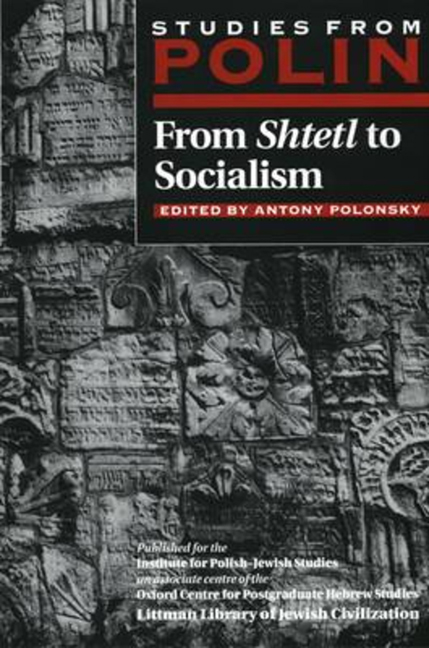Book contents
- Frontmatter
- Dedication
- Editors and Advisers
- Polin
- Polin: Studies in Polish Jewry
- Acknowledgements
- Contents
- List of Maps
- Introduction
- PART I PRE-PARTITION POLAND (to 1795)
- PART II THE NINETEENTH CENTURY
- PART III BETWEEN THE TWO WORLD WARS
- PART IV THE SECOND WORLD WAR
- PART V AFTER 1945
- 25 The Contexts of the So-Called Jewish Question in Poland after World War II
- 26 Is there a Jewish School of Polish Literature?
- 27 A Voice from the Diaspora: Julian Stryjkowski
- 28 Poles and Poland in I. B. Singer's Fiction
- Notes on Contributors
- Chronological Table
- Maps
- Glossary
- Index
28 - Poles and Poland in I. B. Singer's Fiction
from PART V - AFTER 1945
- Frontmatter
- Dedication
- Editors and Advisers
- Polin
- Polin: Studies in Polish Jewry
- Acknowledgements
- Contents
- List of Maps
- Introduction
- PART I PRE-PARTITION POLAND (to 1795)
- PART II THE NINETEENTH CENTURY
- PART III BETWEEN THE TWO WORLD WARS
- PART IV THE SECOND WORLD WAR
- PART V AFTER 1945
- 25 The Contexts of the So-Called Jewish Question in Poland after World War II
- 26 Is there a Jewish School of Polish Literature?
- 27 A Voice from the Diaspora: Julian Stryjkowski
- 28 Poles and Poland in I. B. Singer's Fiction
- Notes on Contributors
- Chronological Table
- Maps
- Glossary
- Index
Summary
When Isaac Bashevis Singer was awarded the Nobel Prize in 1978, most Polish people heard his name for the first time. Singer's absence from the Polish literary scene had been caused to a great extent by the general silence surrounding Jewish topics after 1968; the campaign against Jerzy Kosinski's The Painted Bird did not help to introduce another writer with similar roots, either. Paradoxically enough, while commenting upon the award, some Polish journalists tried to present Singer as a Polish writer, attempting in this way to gain a Polish Nobel Laureate; let us remember that this was before Miiosz and Waif sa and some Poles had a complex about not being sufficiently appreciated on the international forum.
Although Singer is not a Polish writer, but a Yiddish one, his work is deeply rooted in the Polish Jewish past. And yet he cannot be described as a mere chronicler of the vanished Jewish world. As Eli Katz observes, ‘his towns of Goray and Bilgoray, Frampol and Zamość, all of which can be located historically and geographically, are more products of the imagination than the invented Tuneyadevke and Glupsk of Mendele, or Sholom Aleichem's Kasrilevke and Kozodeyevke’. This sentence rightly points at one of the most important aspects of Singer's fiction. His imagination has a transformatory power, changing historical reality into his own fictitious one. The fact that he himself is a post-Holocaust chronicler of the pre- Holocaust world makes his vision substantially different from those of classic Yiddish writers whose reality could have been threatened by pogroms and legal decrees, but was nevertheless perceived as relatively stable and static.
What makes his work attractive to the Polish reader is not only the depiction of the Jewish community, exotic to the modern Polish audience, but also his image of Poles and Poland, his views on Polish customs, history, politics, and so on. Reading The Manor or The Estate, the Polish reader is fascinated and puzzled to find a different interpretation of certain historical events or social phenomena from the one he knows from classical Polish literature.
In Poland, Singer has received mainly favorable criticism, but this seems partly due to the fact that only some of his novels and stories were translated into Polish and also because he is not directly concerned in his fiction with the Holocaust, which appears to be the most controversial issue for Polish critics.
- Type
- Chapter
- Information
- From Shtetl to SocialismStudies from Polin, pp. 502 - 516Publisher: Liverpool University PressPrint publication year: 1993

